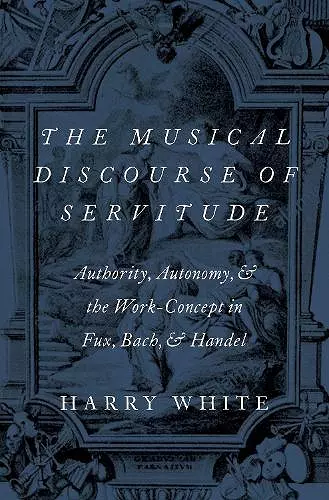The Musical Discourse of Servitude
Authority, Autonomy, and the Work-Concept in Fux, Bach and Handel
Format:Hardback
Publisher:Oxford University Press Inc
Published:5th Nov '20
Currently unavailable, and unfortunately no date known when it will be back

Examining, for the first time, the compositions of Johann Joseph Fux in relation to his contemporaries Bach and Handel, The Musical Discourse of Servitude presents a new theory of the late baroque musical imagination. Author Harry White contrasts musical "servility" and "freedom" in his analysis, with Fux tied to the prevailing servitude of the day's musical imagination, particularly the hegemonic flowering of North Italian partimento method across Europe. In contrast, both Bach and Handel represented an autonomy of musical discourse, with Bach exhausting generic models in the mass and Handel inventing a new genre in the oratorio. A potent critique of Lydia Goehr's seminal The Imaginary Museum of Musical Works, The Musical Discourse of Servitude draws on Goehr's formulation of the "work-concept" as an imaginary construct which, according to Goehr, is an invention of nineteenth-century reception history. White locates this concept as a defining agent of automony in Bach's late works, and contextualized the "work-concept" itself by exploring rival concepts of political, religious, and musical authority which define the European musical imagination in the first half of the eighteenth century. A major revisionist statement about the musical imagination in Western art music, The Musical Discourse of Servitude will be of interest to scholars of the Baroque, particularly of Bach and Handel.
Harry White has the unusual and idiosyncratic ability to link cultural debates about servitude and autonomy to very specific moments in the music of three of the greatest musical figures of the eighteenth century. He not only achieves the seemingly impossible task of integrating J. S. Bach and Handel into one discussion, but goes even further by introducing Fux, a figure who had the tenacity to derive creative capital from the highest degree of musical servitude. We learn about political power, religious prescription, drama, poetry, and the emerging power of autonomous musical works-all articulated with a literary flair that is rare in musicological discourse. * John Butt, Gardiner Professor of Music, University of Glasgow, and Musical Director, Dunedin Consort *
Harry White's new book is a singular achievement, which synthesizes a lifetime's deep engagement with the music of Fux, Bach, and Handel. Its central thesis — that the monarchic indenture of Fux offsets the emerging emancipatory modernity of Bach and Handel — is evidenced by a deft mixture of historical, cultural, and analytical commentary, and underpinned by a commanding knowledge of the long-overlooked legacy of the Austrian Baroque. Ultimately, White makes explicit just how crucial debates about the origins of the modern musical imagination remain. Virtuosic in style and magisterial in scope, this book makes a vital contribution to the cultural study of eighteenth-century music. * Julian Horton, Professor of Music Theory and Analysis, Durham University *
White exercises an "autonomy" of thought, but also a "servitude" to both musicology and music. * Ivan Curkovic, BACH Journal *
ISBN: 9780190903879
Dimensions: 160mm x 241mm x 18mm
Weight: 454g
326 pages